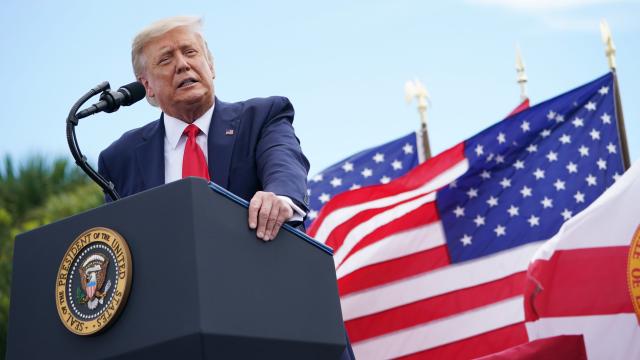Ever since the covid-19 pandemic made its way around the world, the question of whether people would accept a potential vaccine has lingered over everything. First, there was the concern that the antivaxxer movement might dissuade people from taking a legitimate vaccine. More recently, the worry has been that U.S. President Trump would rush out an unproven vaccine to earn a U.S. election bump in November. It’s all gotten to the point that pharmaceutical giants seem to think the world could use some reassurance.
On Tuesday, nine of the world’s biggest pharmaceutical companies (AstraZeneca, BioNTech, GlaxoSmithKline, Johnson & Johnson, Merck, Moderna, Novavax, Pfizer, and Sanofi) signed on to a pledge assuring the public of their “on-going commitment to developing and testing potential vaccines for COVID-19 in accordance with high ethical standards and sound scientific principles.”
But what does that mean? The pledge outlines four particular points that the companies promise to uphold:
- Always make the safety and well-being of vaccinated individuals our top priority.
- Continue to adhere to high scientific and ethical standards regarding the conduct of clinical trials and the rigour of manufacturing processes.
- Only submit for approval or emergency use authorization after demonstrating safety and efficacy through a Phase 3 clinical study that is designed and conducted to meet requirements of expert regulatory authorities such as FDA.
- Work to ensure a sufficient supply and range of vaccine options, including those suitable for global access.
If the goal is to make people feel safer about a future vaccine, it seems unwise to make a big deal out of vague shit like making patient safety a “top priority.” But the vow to complete Phase 3 clinical studies is helpful to some degree. In the long-form letter, the companies said that they will follow the FDA’s approval process, which requires “that scientific evidence for regulatory approval must come from large, high quality clinical trials that are randomised and observer-blinded, with an expectation of appropriately designed studies with significant numbers of participants across diverse populations.”
The FDA has done some damage to its credibility over the last six months. In June, the agency revoked an emergency authorization of hydroxychloroquine for treating covid-19 patients after scientists determined that it was ineffective and could cause serious side effects. The whole episode left many unresolved questions as President Trump has been bizarrely fixated on promoting the drug. Likewise, the FDA’s emergency use authorization of convalescent plasma for treating covid-19 patients has been met with controversy. Shortly after Trump hyped the FDA’s decision, the National Institutes of Health felt compelled to issue a statement saying that we don’t currently have data to support the “efficacy and safety of convalescent plasma for the treatment of COVID-19.”
FDA-authorised vaccines should be considered safe by the public, but the untrustworthiness of the man occupying the White House has caused people who have no antivaxxer urges to think twice about what the future holds. In September, news broke that the FDA was informing state public health officials that they should be planning to distribute a vaccine by early November — a date that would theoretically help Trump’s reelection prospects despite the fact that vaccine trials aren’t believed to be anywhere near completion.
Over Labour Day weekend, Democratic Vice Presidential candidate Kamala Harris said she “would not trust Donald Trump” if he said that a vaccine is ready for distribution, and that she would need “a credible source of information that talks about the efficacy and the reliability” of anything that he touts to get us out of our current pandemic hell.
Trump quickly turned the tables and accused Harris of “reckless anti-vaccine rhetoric.” It was an infuriating moment precisely because Trump has expressed vaccine scepticism in the past and at least one study found that his antivaxxer tweets have intensified these dangerous sentiments among his supporters. And his inability to tell the truth or absorb scientific information is the primary cause for concern when it comes to a potential vaccine in the future.
So, will the promises of scuzzy pharmaceutical companies that spend their days profiting off of misfortune provide anyone with a semblance of reassurance? I don’t know, but it’s better than taking Trump’s word for it.
